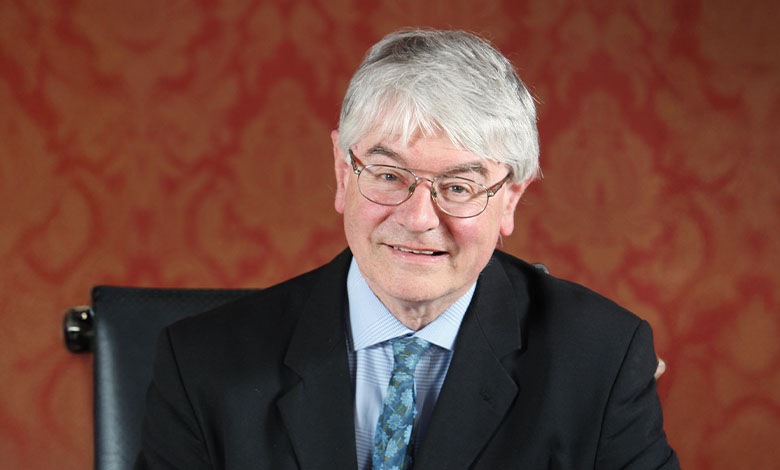Martin Mansergh: 1946-2025

Martin Mansergh, the former Fianna Fáil TD who played a key role as a diplomat in the Good Friday Agreement negotiations, died aged 78 in September 2025.
Martin Mansergh was born on New Year’s Eve, 1946, immediately after the end of The Emergency, a point from which the divisions on this island were at their most pronounced amid the North’s participation in the Second World War while the State remained neutral.
Mansergh was the son of Anglo-Irish Protestants from County Tipperary, an unlikely path into the Fianna Fáil of old. However, after serving as a diplomat in the Department of Foreign affairs in the mid-1970s, Mansergh was recruited to Fianna Fáil by then-Taoiseach Charles Haughey, who he described as a “father figure” in the 2011 RTÉ docuseries, The Rise and Fall of Fianna Fáil.
At that time, Haughey was largely associated with the party’s ‘green wing’, amid the fallout of the Arms Crisis.
Mansergh became Fianna Fáil’s Director of Research and a Special Advisor on the North from 1981 until 2002. In that role he was deeply involved in backchannel, secret and formal discussions between the Irish Government and norther nationalist and republican leaders. He was also involved in drafting speeches, policy documents, and strategy for Fianna Fáil in matters related to the North.
Mansergh’s approach to the North was marked by patience, empathy, and a belief in dialogue over exclusion. He was among those within Fianna Fáil who argued that progress could only come through direct engagement with the armed republican movement, even when such views were politically unpopular.
Working quietly behind the scenes, he became a trusted intermediary between government figures and Sinn Féin representatives, including in the years leading up to the first IRA ceasefire in 1994.
He was a key contributor to the framework that later underpinned the Good Friday Agreement, advocating for recognition of both traditions on the island and for constitutional change that respected the principle of consent. Colleagues described him as “methodical and moral”, someone who understood both the emotional charge and the historical weight of partition.
While many in Fianna Fáil at the time viewed unity through a purely nationalist lens, Mansergh’s perspective was more layered. He spoke often about the need to accommodate British and unionist identities within any future Irish constitutional arrangement, and cautioned against triumphalism.
In later years, he expressed frustration that Fianna Fáil had grown hesitant in articulating a clear vision for eventual reunification, urging a “practical preparation for a shared Ireland” rather than symbolic gestures.
After this role, and with the conflict in the North brought to a negotiated end of violence, Mansergh stepped out of the shadows and into the frontline of politics, first attempting to be elected to the Dáil in 2002, before becoming a Senator later that year, and finally becoming a first-time TD aged 60 in 2007.
Mansergh was propelled straight into ministerial office, holding three junior ministerial roles in his five years in the Dáil, including as a junior finance minister under the leadership of Brian Lenihan.
Mansergh was one of the seemingly endless Fianna Fáil casualties in the 2011 election, with the party emphatically defenestrated as it bore the brunt of people’s anger amid the financial crisis and subsequent austerity measures.
Although he never returned to frontline politics, Mansergh maintained an active role in political commentary, appearing as a panellist at various events associated with religious rights and Irish reunification.
He was vice-chair of the Government’s Expert Advisory Group on the Decade of Centenaries and was elected a member of the Royal Irish Academy in May 2018.
Taoiseach Micheál Martin TD describes Mansergh as “unquestionably one of the most important public servants in our recent history”.
“As a diplomat and then as an advisor to leaders of Fianna Fáil, both in government and in opposition, he was exceptional in his knowledge and devotion to the cause of peace on our island and throughout Europe.
“Martin was a one-off. A true Irish republican. A man of great accomplishments who leaves a proud history.”
Former Taoiseach and Fianna Fáil leader Brian Cowen says of Mansergh: “His long service to the party, culminating in his time as a member of Dail Éireann for the constituency of South Tipperary, was deemed the ultimate honour and one of which he was most proud.
“His in-depth knowledge of the detail of policy issues was something I witnessed at first hand when part of a negotiation team in the formation of governments in both Mr Reynold’s and Mr Ahern’s time.”
Former Sinn Féin leader Gerry Adams says he was “a key figure in the efforts to build the peace process and the success of the negotiation leading to the Good Friday Agreement”.
Adams adds: “He was one of those who met with Sinn Féin in the late 1980s on behalf of Fianna Fáil and we retained a close relationship since then.”
Mansergh is survived by his wife Elizabeth, his children, and extended family.
Ar dheis Dé go raibh a anam.





